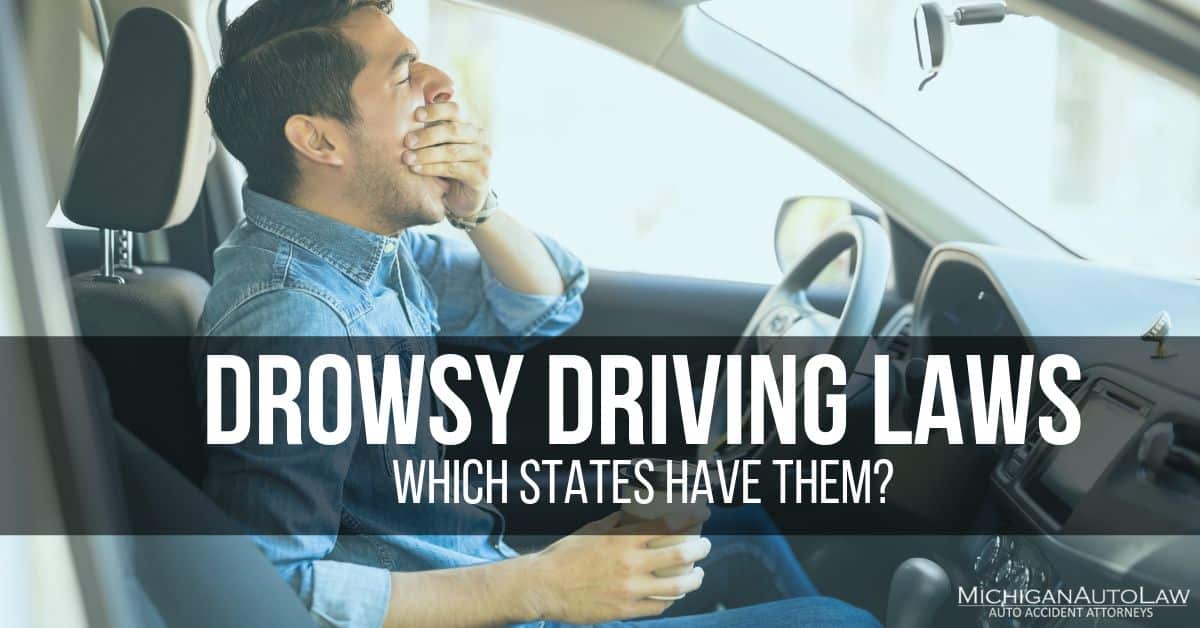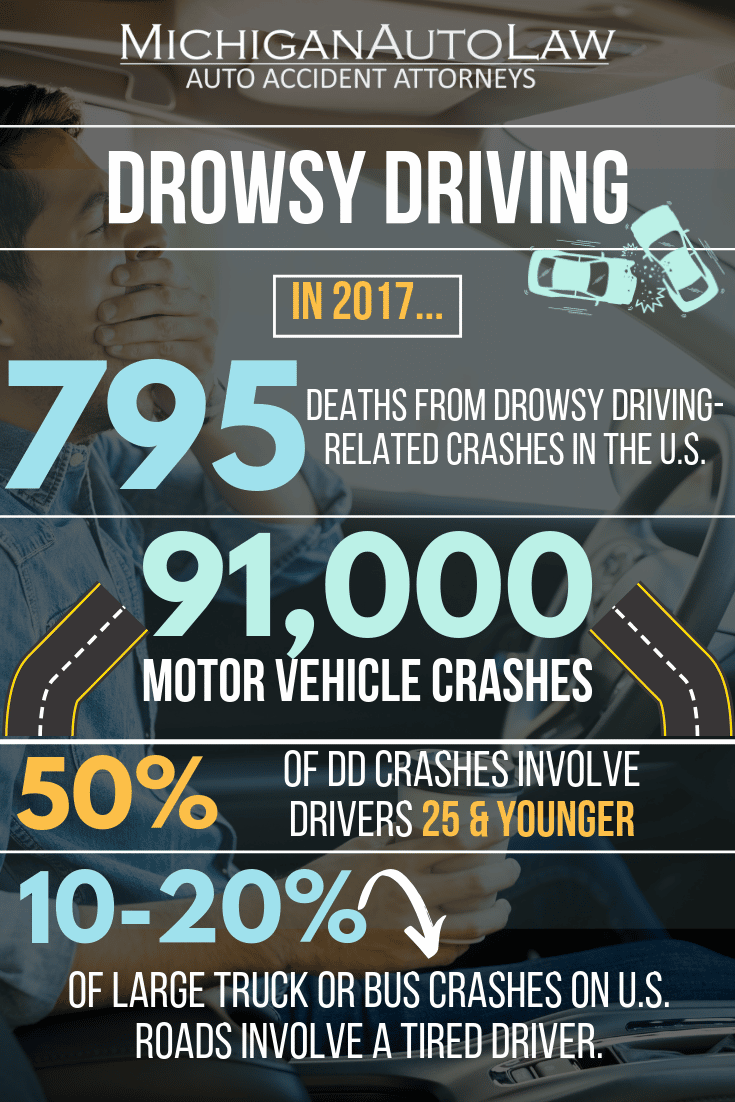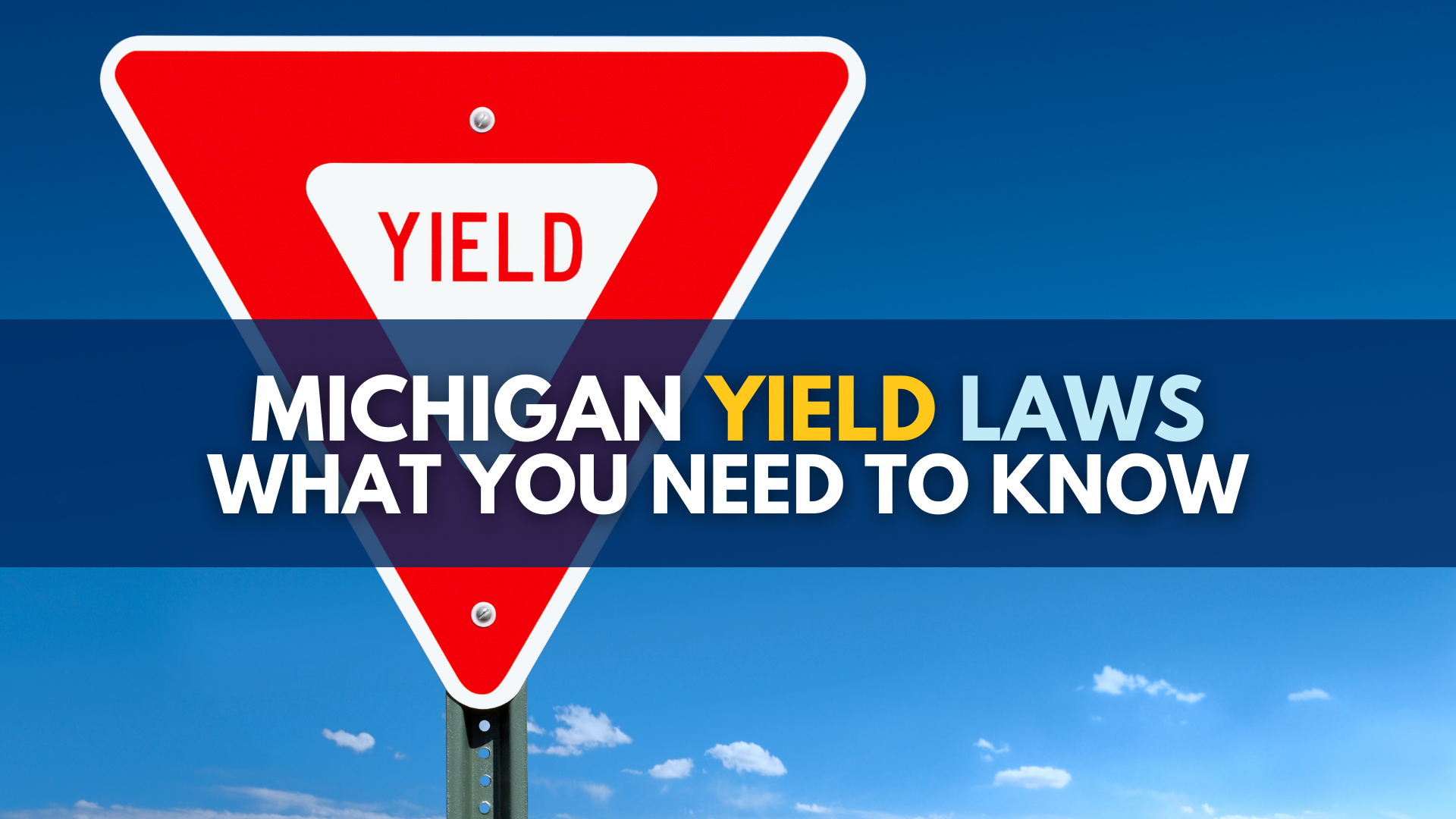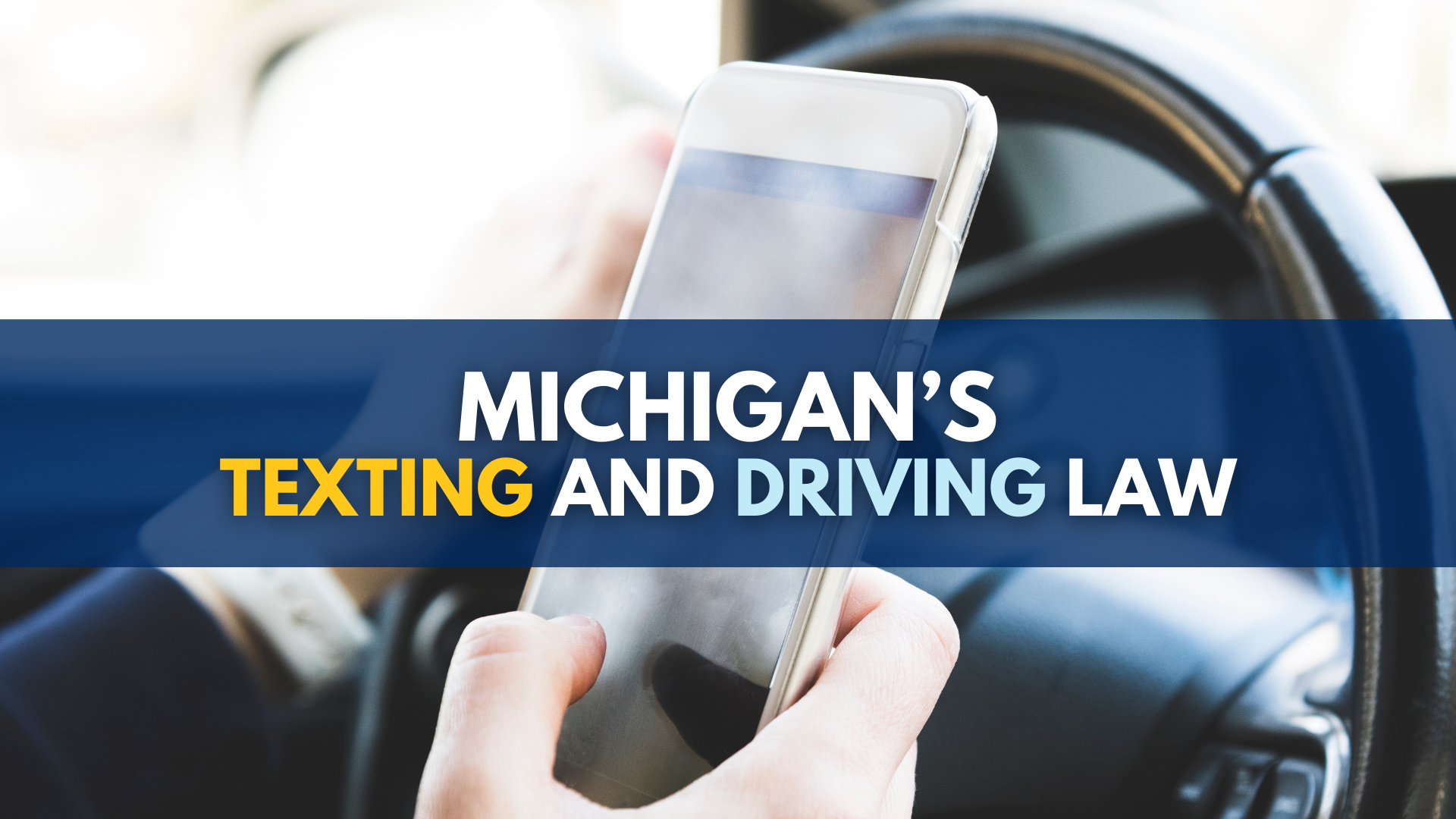
There are only two states in the nation that have drowsy driving laws. Michigan is not one of them.
The science behind drowsy driving laws is compelling, and there are some excellent reasons why Michigan and 47 other states should “wake up” to the very real dangers posed by excessively fatigued and dangerously sleepy drivers who are behind the wheel and causing otherwise very preventable car accidents:
- There were 795 deaths from drowsy driving-related car crashes in the U.S. in 2017. *
- There were 91,000 motor vehicle crashes involving drowsy driving in the U.S. in 2017. *
- 50% of drowsy driving crashes involve drivers age 25 or younger. **
- Ten to 20% of large truck or bus crashes on U.S. roadways involve a tired driver. **
- Drowsy driving can impair a driver as much as drunk driving: “A motorist who has been awake for an extended period of time will likely experience performance deficits similar to that of someone who has been drinking. For example, a motorist who is up for a continuous 18 hours will typically exhibit performance levels similar to that of a person with a Blood Alcohol Concentration (BAC) level of 0.05%. After 21 and 24 hours without sleep, performance mimics a BAC of 0.08% and 0.10%, respectively.” **
- Being “fatigued or asleep” was a driver condition in 9 fatal crashes, 1,415 injury crashes and 2,164 property-damage-only crashes in Michigan in 2017. In 2016, fatigue and sleep were driver conditions in 17 fatal crashes, 1,195 injury crashes and 2,065 property-damage-only crashes. ***
- A drowsy driver who has had less than five hours of sleep is nearly five times more likely to be involved in an auto accident. ****
(Sources: * = “Drowsy Driving,” NHTSA; ** = “WAKE UP CALL! Understanding Drowsy Driving and What States Can Do,” Governors Highway Safety Association; *** = Michigan Traffic Crash Facts (MTCF), Vehicle/Driver, “Driver Condition”; **** = “Why do people have drowsy driving crashes?,” AAA Foundation for Traffic Safety, Page 50 (1999))
Below I will discuss which states have enacted drowsy driving laws and what other states who haven’t enacted drowsy driving laws are doing (or not doing) to stop excessively fatigued driving from injuring and killing innocent motorists in what are completely preventable car accidents.
What States Have Drowsy Driving Laws?
The only two states that have enacted drowsy driving laws to combat the dangers of fatigued driving are Arkansas and New Jersey.
In April 2013, Arkansas amended its “Negligent Homicide” statute (Arkansas Code 5-10-105(a)(1)(D) and (c)(1)) to provide:
- “A person commits negligent homicide if he or she negligently causes the death of another person, not constituting murder or manslaughter, as a result of operating a vehicle … [w]hile fatigued …”
- “‘Fatigued’ means: (A) Having been without sleep for a period of twenty-four (24) consecutive hours; or (B) Having been without sleep for a period of twenty-four (24) consecutive hours and in the state of being asleep …”
Similarly, New Jersey’s “Death by auto or vessel” statute, 2C: 11-5(a), defines criminally reckless driving in terms of the driver being “asleep” or “without sleep” for more than 24 hours. Specifically, New Jersey’s vehicular homicide law provides:
“Criminal homicide constitutes vehicular homicide when it is caused by driving a vehicle … recklessly” and “[p]roof that the defendant fell asleep while driving or was driving after having been without sleep for a period in excess of 24 consecutive hours may give rise to an inference that the defendant was driving recklessly.”
What Are States Without Drowsy Driving Laws Doing to Protect Their Citizens?
Like Michigan, the states below have not enacted drowsy driving laws.
But many states have acknowledged the dangers of fatigued driving. Though drowsy driving laws aren’t on the books in the states listed below, they have taken some steps (however small they may be) to spread a safety message to their citizenry about the dangers of driving fatigued.
- Alabama: In April 2016, Alabama passed SJR 71, which designated November 19th as Drowsy Driver Awareness Day “as an annual reminder of the tragic consequences of fatigued driving.”
- California: In April 2005, California passed SCR 27, which proclaimed April 6th Drowsy Driver Awareness Day “to observe the importance of educating the public on drowsy driving, and to remember those thousands of Californians who have died in collisions related to drowsy driving” and “emphasize the preventability of all crashes related to drowsy driving.”
- Florida: In 2010, Florida passed the “Ronshay Dugans Act,” 683.332, which designates the first week of September as “Drowsy Driving Prevention Week.” The law emphasizes that, during this week, “the Department of Highway Safety and Motor Vehicles and the Department of Transportation are encouraged to educate the law enforcement community and the public about the relationship between fatigue and performance and the research showing fatigue to be as much of an impairment as alcohol and as dangerous while operating a motor vehicle.”
- Iowa: Iowa collects and analyzes crash data to assess the role of drowsy driving. It also includes safety messages about drowsy driving on its electronic, highway billboards. Additionally, state troopers are trained to recognize fatigue among truck drivers and drivers of commercial vehicles.
- Michigan: Through its annual “Michigan Traffic Crash Facts” publication, which is produced by the Office of Highway Safety Planning, Michigan gathers and reports data about fatal, injury and property damage only car crashes involving drivers who were “Fatigued or asleep.”
- New York: Though New York hasn’t enacted drowsy driving laws, the state tracks and analyzes crash data to evaluate the prevalence of fatigued driving. Significantly, if a crash report shows that a driver was fatigued/drowsy/asleep, then the state’s Medical Review Unit will require the driver to submit a medical statement certifying that he or she is capable of safely driving. The symptoms and dangers of drowsy driving are addressed as part of New York’s driver education program. State troopers are trained to recognize and detect truck drivers and drivers of commercial vehicles who are showing signs of fatigue or drowsy driving.
- Texas: In 2013, Texas passed H.R. 1389 which recognized November 6-12 as “Drowsy Driving Prevention Week,” emphasizing that the “Lone Star State will benefit from greater numbers of drivers who understand the dangers of drowsy driving and continue to address this problem that threatens all who use our streets and highways.” Texas also collects data about drowsy driving-related crashes and partners with the National Safety Council to help employers educate their employees on safe driving practices such as not driving when they are fatigued or sleepy.
- Utah: Though there aren’t any drowsy driving laws on the books in the state of Utah, they collect and analyze crash data to assess the role of drowsy driving, noting that “crashes in rural Utah are three times more likely to involve a drowsy driver.” Highway billboards is one of the ways the state spreads its safety message about fatigued driving. In 2014, the Utah legislature designated the third week in August as “Drowsy Driving Awareness Week.” Driver education for teen drivers includes learning about the dangers of drowsy driving.
(Sources: “Summaries of Current Drowsy Driving Laws,” National Conference of State Legislatures, July 10, 2018; “WAKE UP CALL! Understanding Drowsy Driving and What States Can Do,” Governors Highway Safety Association)



